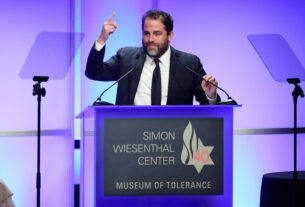Over the last several years, debates over antisemitism and Israel/Palestine have roiled the German-speaking world. In 2019, the director of Berlin’s Jewish Museum, Peter Schäfer, was forced to resign after the museum tweeted about a petition against the German government’s decision to designate the BDS movement as antisemitic. In the spring of 2020, Germany’s (non-Jewish) commissioner on antisemitism Felix Klein demanded that Cameroonian political theorist Achille Mbembe be barred from speaking at the Ruhrtrienniale cultural festival because Mbembe had signed a BDS petition. Last fall, in response to this repressive climate, leading figures in German intellectual and cultural life signed an open letter warning that the government’s anti-BDS measures were stifling the exchange of free ideas in the public sphere.
Yet this fight is not only playing out in the realms of government or high culture. Long before the German government moved to quash criticism of Israeli policies, a significant part of the German-speaking radical left, formed following German reunification in the 1990s, became ardent supporters of Israel. They call themselves “Antideutsche”—“anti-Germans”—and they consider Zionism an integral part of their antifascist politics. In practice, this tendency leads to some contradictory stances: self-proclaimed anarchists waving the Israeli flag or Antifa groups chanting “fuck the police” at protests while posting memes of Israeli fighter jets flying over Auschwitz on social media. In a recent case, non-Jewish Germans shut down an event by the Israeli-led “School for Unlearning Zionism” in Berlin on account of “antisemitism.” The current measures by the German government against critics of Israel show that Antideutsche-style politics on Israel/Palestine are now mainstream in countries that were formerly part of the Third Reich.
I faced the ire of the Antideutsche last year in Vienna, where I was publicly attacked by the local Antifa group. I had been invited to give a speech at a memorial for the victims of the 2020 neo-Nazi attacks in Hanau, Germany. It was my first public address as a Jewish activist, though I’ve been performing Yiddish revolutionary songs at protests for several years and recently ran for district council with a new left-wing party in Vienna’s historically Jewish district. Falsifying quotes and ripping others out of context, Jewish student representatives and the non-Jewish local Antifa group posted public statements on social media that accused me of antisemitism for speaking about how Jews could still benefit from white or class privilege, ignoring my Jewish identity.
Amid this mess, I first turned to Michael Sappir, an Israeli antifascist and socialist activist living in Leipzig. In 2020, Sappir was at the center of a similar episode: A left-wing cultural center canceled his talk about the history of the Jewish left in pre-war Europe because of a mention of “German imperialism” in the event’s description as well as his defense of the right to boycott Israel. Over the past few months, Michael and I have met frequently on Zoom to process our experiences of being left-wing Jewish activists in Germany and Austria. Last summer, Michael decided to organize with other Israeli leftists in Leipzig who were being bullied, silenced, or defamed for speaking out about politics in their home country. They launched a new activist collective in March of this year called JID (pronounced Yid), short for “Jewish-Israeli Dissent.” The launch of JID made me hopeful that left-wing Jews organizing as Jews could break with the hegemony of Antideutsche politics and shatter the monolithic image of Jewish communities so prevalent in German-speaking public discourse.
In April, Michael and I got together on Zoom, as we often do, to discuss the launch of JID, our experiences of being “canceled” by the Antideutsche left, and our perspectives on Jewish identity in Germany and Austria today.
Isabel Frey: What’s happening to people who speak out against Israeli policies in Germany right now?
Michael Sappir: It’s really similar to what’s happening in the United States or the UK. The Israeli government is pouring a huge amount of resources into quashing criticism of its policies. What’s different here is that parts of the radical left are in lockstep with the right-wing government in Germany. Although the more I get to know the Antideutsche, the more I see that they’re only culturally part of the left; their politics are not anymore. When I moved back to Leipzig two years ago, I was very eager to get into political work. I ended up going to an open meeting held by a local Antifa group, where I was suddenly confronted by invitations to talks with center-right Zionist slogans as the titles, like “Israel: The Only Democracy in the Middle East.” It took me a year after this to return to political work.
Last summer, a few Israelis got together with a few others in Leipzig to set up a demonstration against the annexation of the West Bank. As soon as we finished the demo, participants—many of whom were Palestinians, Syrians, or people from other Arab countries—came up to thank us. They told us that if they had tried to organize a protest like this, they would have been physically assaulted by local Antifa groups. This was the first event on the way to JID.
With JID we want to focus on the leftist scene, because the left is our home. In Leipzig, this scene is dominated by Antideutsche politics. But there is also a lot of ignorance about Israel/Palestine, and we think we can make a difference by giving German leftists access to our experience. I don’t expect to turn Zionist Germans into anti-Zionists just because I’m anti-Zionist, but I do expect to be able to show them what anti-Zionism means for left-wing Jewish Israelis. I want them to understand that it’s not so straightforward as “Israel and the Jews versus all the bad guys.” Not only is this just simplistic; it also dehumanizes Jews because it denies us the collective humanity of having different opinions, internal struggles, and disagreements.
IF: The political mainstream in Germany and Austria is philosemitic. Jews are fetishized in this pseudo-tolerant way and assumed to have unified interests. How do you think about organizing under these conditions?
MS: I think about this challenge through the concept of the “theater of remembrance,” which I first encountered through the poet and writer Max Czollek. Jewish politics in contemporary Germany is structured by this “theater of remembrance,” in that we’re not exactly silenced but, rather, given a few very specific roles to play, all in relation to the triangle of Israel, antisemitism, and the Holocaust. In JID, we find it important to emphasize that the Antideutsche are a symptom of something larger, this bigger dimension of how society treats Jewish people, and how that boxes us in. That’s how we responded when my talk was canceled by a left-wing cultural center. The talk was just going to be about Revolutionary Yiddishland, a book about the history of the Jewish left in Europe, which was inspiring to me personally because it shows how marginal Zionism was for working-class Jews in prewar Europe.
IF: Part of why I got in trouble for my speech at the Hanau commemoration in Vienna was that I was speaking as a Jew about my class and white privilege. Yet in the Austrian theatre of remembrance Jews can only be the most oppressed minority. I imagine that JID, as Jewish Israelis, probably clash even more with that expectation?
MS: Yes, although the Israeli relationship to power and victimhood is more complicated. On the international stage, Israel propagates the idea of Jews as history’s eternal victims; this is a crucial part of how Israel defends its actions, particularly when facing criticism. But at the same time, the dialectic of Zionism says, “We were these historical victims. We were almost destroyed—and our answer to that is to be a strong military power.” The Antideutsche left faces a similar contradiction when they celebrate Israel’s military might because they do not deny that Israel is powerful. There is this sticker that the Antideutsche like to put up in Leipzig, which says “Am Yisrael Chai” in blue and white with the Mossad logo on it. When I sent this to a group of leftist Israeli friends on WhatsApp, one of them asked: “So is this like a Nazi thing to spread paranoia against Jews?” That’s how we read this stuff—the fantasy of Israel’s international power comes across to us as antisemitic.

IF: On the JID website it says, “We each have a different, often ambivalent relationships with the labels ‘Jewish’ and ‘Israeli,’” and that you would have preferred not to organize under any national or ethnic banner. “However,” you add, “we made a conscious decision to emphasize our identity, both because the discussions of antisemitism and ‘Israel solidarity’ affect us in specific ways related to our background, and because our background allows us to speak up where others are violently silenced.” To me, it almost sounds like you didn’t have a choice.
MS: In Germany’s philosemitic atmosphere, if we weren’t Jewish Israelis, we wouldn’t be able to speak up at all about Israel/Palestine. When we talk about Palestine, we try to stress our privileged position as Jews—that we can speak up about these issues in ways that Palestinians cannot. People listen to us because we’re Jewish, but that often means they’re ignoring the huge Palestinian diaspora in Germany. Still, many Israelis who move to Germany do have an ambivalent relationship to Zionism and Jewishness. Many of us have discovered that we don’t want to identify that way anymore. When I first moved to Germany, I just wanted to become a German—to be one of the “normal people.” But with time I grew to understand that I can never change my background, and that I shouldn’t need to.
Because the discourse about Israel in Germany is connected to the discourse about antisemitism, it’s also important to show that we care about antisemitism. The German national antisemitism commissioner, Felix Klein, was asked in a recent interview what he thinks about anti-Zionist Israelis in Germany speaking out against Israeli policies, and he said he wishes we would be more sensitive to Germany’s historical responsibility for the Holocaust. That is such chutzpah. We decided to call ourselves JID to make it clear that we are affected by antisemitism, and to show that Zionism is not and never was the only answer to it.
IF: I do sometimes worry that certain parts of the Jewish left are so much on the defense in the fight against antisemitism, that they forget to actually fight it. But amid the rising antisemitism on the right, we do need to find a strategy to actually get into the offense of fighting antisemitism, because we are in a vulnerable position.
What’s so absurd about the situations you and I found ourselves in, and in the German-speaking world more broadly, is that Jewish leftists are being accused of antisemitism by non-Jewish leftists. To me, these accusations are a way of denigrating our Jewish identities, of saying that we’re the “wrong kind” of Jew. I keep asking myself, are these accusations themselves a kind of antisemitism?
MS: I think it is an expression of antisemitism. It’s non-Jews deciding what roles Jews are allowed to play. But I also suspect it’s not useful to publicly call this out as antisemitism. If you want to work against the instrumentalization of accusations of antisemitism, you’ve got to be careful when you do levy the accusation.
IF: In both the Israeli and diaspora Jewish experience in Europe, Zionism has come to subsume nearly all of Jewish identity. It seems like the way to begin to undo this is through engagement with diaspora history. It doesn’t necessarily have to be Yiddish or revolutionary history, but studying histories of intra-Jewish class conflict, ethnic differences, dialects, and diasporic cultures could help Jewish leftists lay claim to the complexity of Jewish life. All that gets erased—not just by the Antideutsche, but in the post-Holocaust theater of remembrance in Germany and Austria.
MS: What you are talking about is a plurality of Jewish experience. There were many different Jewish cultures—the early Zionists saw specifically the plurality of Jewish languages as a threat to establishing Hebrew as the spoken language. While in Israel today there is a growing interest in diaspora languages like Yiddish, Ladino, and Judeo-Arabic, this plurality doesn’t threaten anyone anymore. But I think that in the diaspora, it’s still a powerful way to reimagine our identities without it all being about Israel.
IF: We’ve spoken a lot about adversaries, but what about allies? What kind of relationships of solidarity does JID have with other groups?
MS: Before we launched, we reached the conclusion that we can’t be in the business of joining other groups’ things. This is somewhat sad, but it is also interesting politically. Because we put our identity, our Jewishness, front and center, we’re in danger of being instrumentalized. Even before we really got started, Palestine solidarity groups worried about being tagged as antisemites invited us to be part of their demos and to put our name on them as a “kosher stamp.” That’s a dilemma for me. I want to support these protests. But the way it works today is that if you work with a group once, you’re responsible for all eternity for anything that group ever does. We don’t have the energy to deal with every controversy affecting every group we might work with, so our policy right now is we don’t join. This approach does limit us, but we’ll see how it develops. We are also interested in getting in touch with Palestinians and possibly also organizing things together.
We do want to connect with people who support our politics, and one of the nicest things about launching JID is that I’ve discovered there are more people on the non-Zionist left in Germany than I thought. In certain types of spaces, the Antideutsche voices are very strong. But there are a lot of people here who are happy to hear our voices.
A previous version of this article stated that Peter Schäfer, the former director of Berlin’s Jewish Museum, was forced to resign because he signed a petition opposing the German government’s move to designate BDS as antisemitic. In fact, Schäfer did not sign the petition; his resignation was the result of the museum’s Twitter account tweeting an article about the petition.
Isabel Frey is a PhD candidate in ethnomusicology at the University of Music and Performing Arts Vienna, a Yiddish singer, and a Jewish social-justice activist based in Vienna, Austria.
The post When “Antifa” Is the Enemy appeared first on Jewish Currents.



